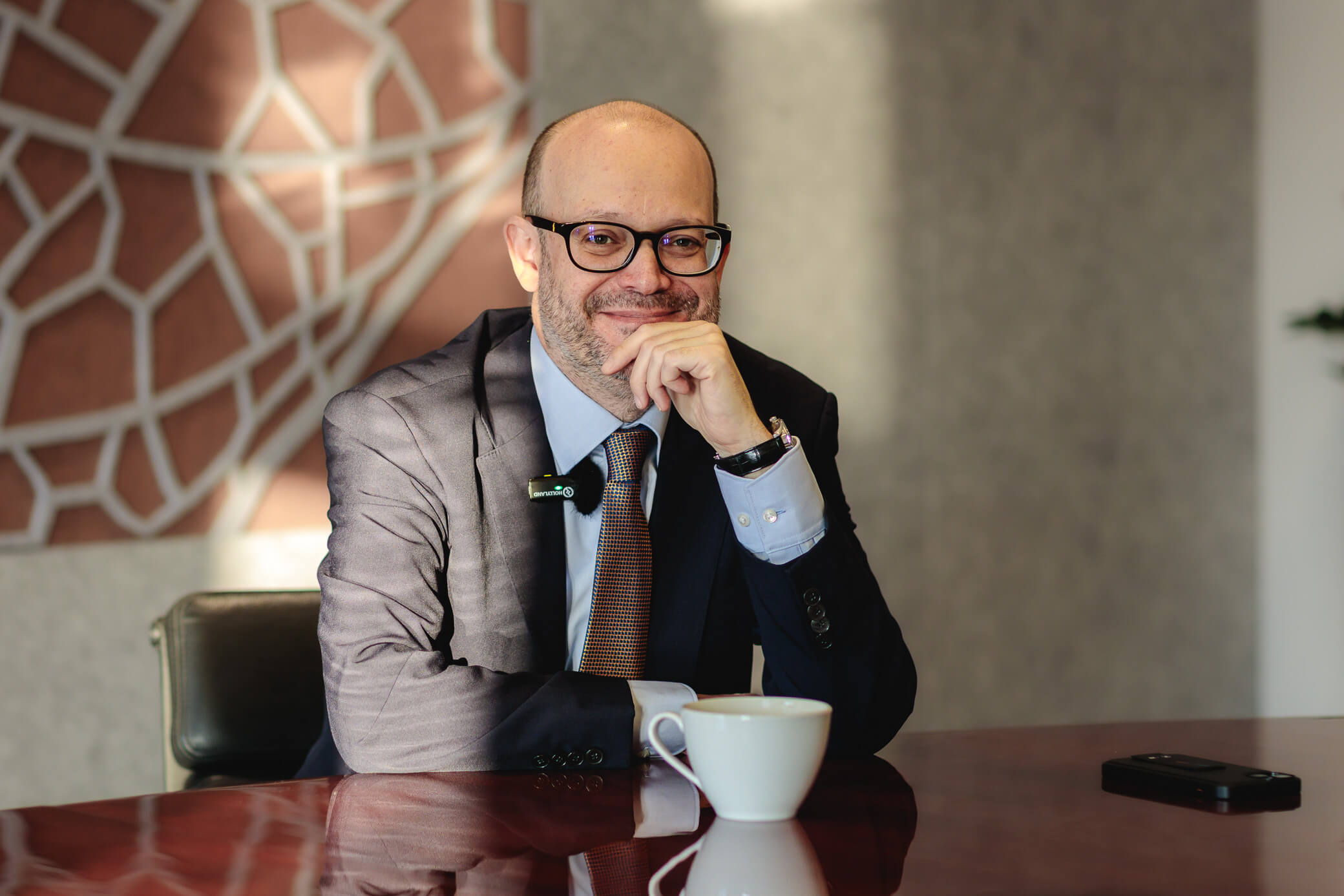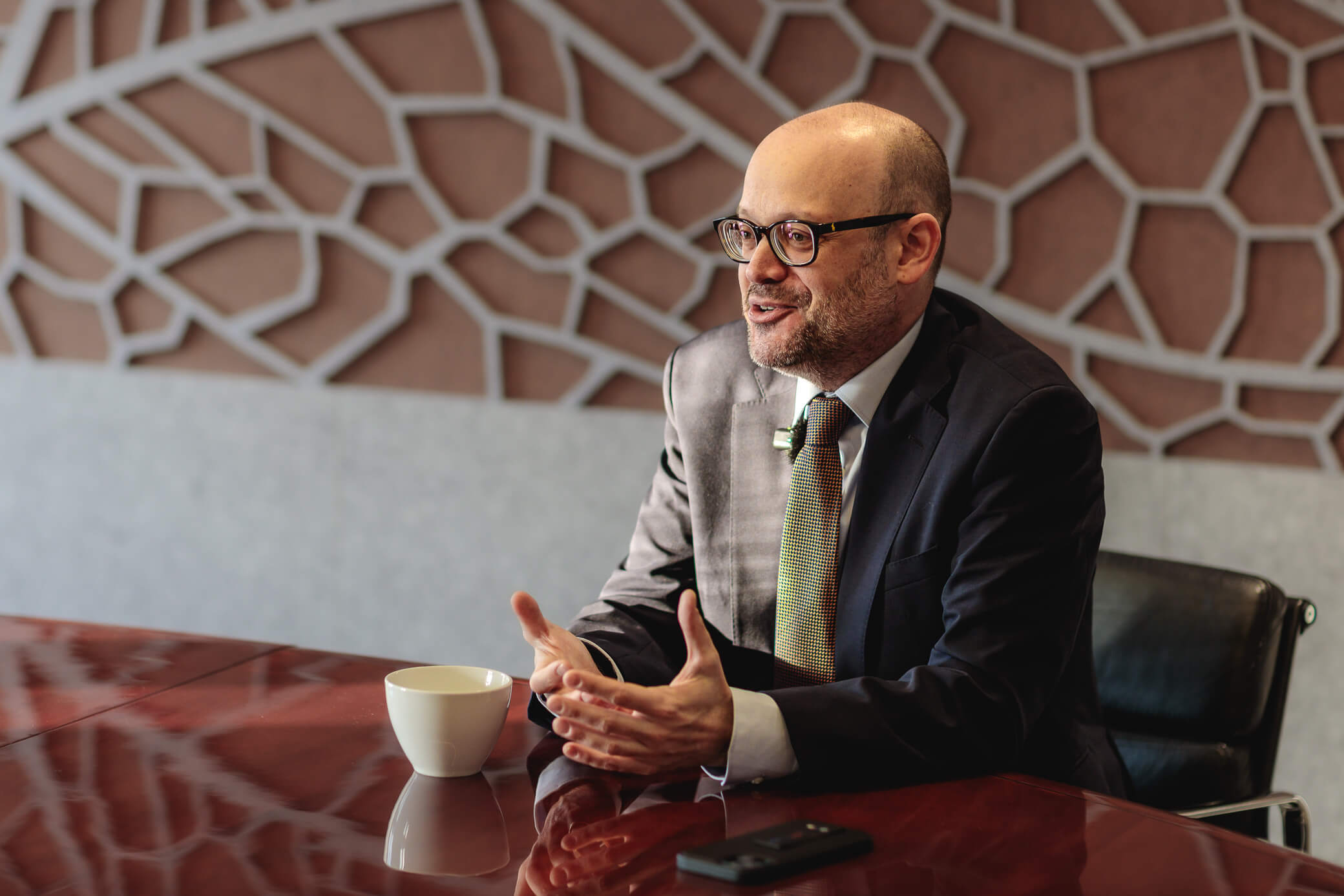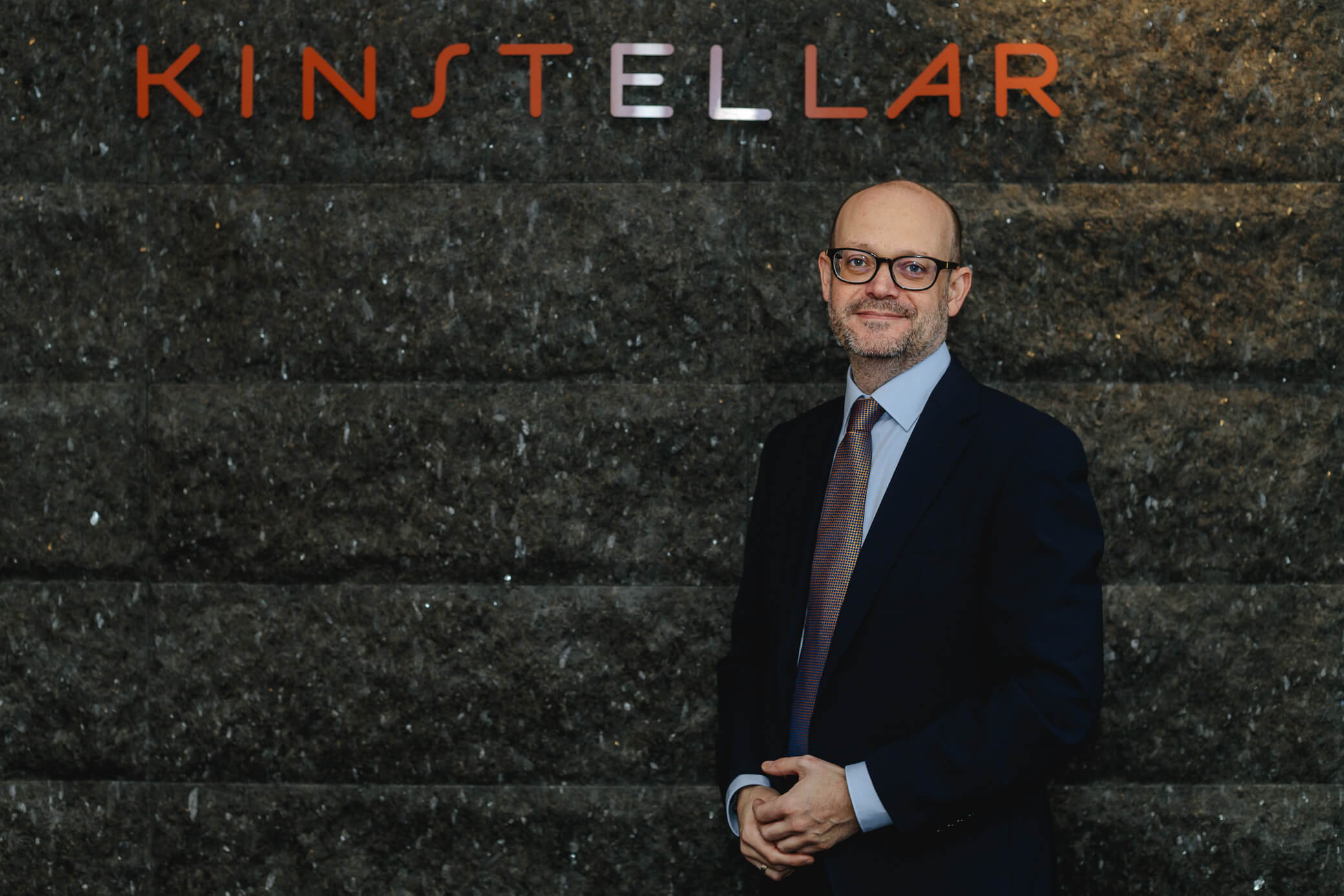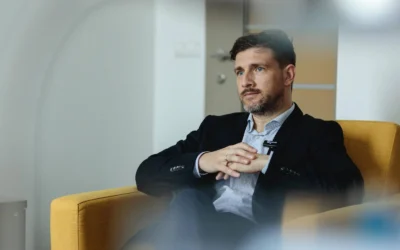With a footprint spanning 12 countries, a team of 550 professionals, and a forward-thinking leadership agenda, Kristóf Ferenczi has been at the helm of Kinstellar—one of the region’s premier law firms—as international managing partner since 2024. In this interview, we explore the development of Kinstellar’s regional network, discuss the complexities of steering such a substantial organization, and examine how technological innovation and human resource strategies are reshaping the legal landscape.
You became head of the Budapest office in 2020, and then Kinstellar’s international managing partner in 2024. In the press release about your appointment, Jason Mogg mentioned that “Kristóf played a key role in implementing numerous projects and initiatives affecting the entire firm.” How did you become involved in the international operations, and what initiatives did you launch?
Right from the beginning, Kinstellar focused on making sure offices worked closely together. The first four Central European offices communicated daily, and as we grew larger and opened offices in more locations, these interactions naturally increased.
We eventually started a “Sector Focus” program, where we created industry-specific teams. I was asked to lead the energy sector team for the whole firm, partly because our Budapest office already had a strong energy law practice. I found this particularly interesting because I could see similar projects happening across different countries. Starting in the mid-2000s, the energy market changed dramatically; in Hungary, we played an important legal role in setting up the first wind farms. Similar changes were happening in other countries where we had offices. I realized that what we learned in one office could help another, and Jason Mogg’s vision really supported this idea.
When we opened our Serbian office, we had the opportunity to handle the legal work for Serbia’s first major wind farm. Back then, no one in Serbia had experience with renewable energy projects because there hadn’t been any such investments before. So Balázs Sepsey and I went to our Belgrade office and spent three intensive days sharing our knowledge. Along the same lines, we organized international conferences and client seminars that we brought from one office to another, as each country in the region faced similar energy market challenges. I wanted to make sure we provided the same high-quality service to our energy sector clients in every office. The ongoing conversations between colleagues in different offices helped us support our clients as they expanded internationally. Many companies that started as just Hungarian energy businesses grew to become regional or international, and we were with them throughout this journey while we also grew and expanded in the region.
Working on these projects gave me a better understanding of how our firm works as a whole.
Another important aspect of Kinstellar’s business model is that we work not only with corporate clients but also with international law firms that don’t have their own offices in our region. These relationships bring in a significant part of our revenue. As part of this, I made many business trips across Europe, Central Asia, and America, while my colleagues visited other parts of the world. This international experience gave me a broader perspective, which helped me in my later leadership roles.
Do you think this kind of activity played a decisive role in your appointment as managing partner?
I could jokingly say you should ask the firm’s leadership about that. Looking back, I see that my appointment was the result of several factors combined, and my leadership of the Budapest office and my role in Kinstellar’s international governing body were key preparatory steps.
This role significantly extends beyond my previous work as a lawyer, as it now involves leading a team of nearly 550 people across 12 countries. The position includes playing a defining role in strategy development, understanding and shaping organizational governance conditions, taking a leading role in business development strategy, and shaping the financial framework for the firm. As would be expected, my responsibilities also include maintaining relationships with key clients and developing our international law firm client base. Naturally, I can only accomplish all this as part of a leadership team.
I believe that my appointment was greatly influenced by the fact that for many years I had been actively thinking about and communicating within the firm about how we could improve our operations, provide better service to our clients, and help our colleagues achieve the milestones set in their careers, in order to remain a competitive and attractive workplace.
By the way, I personally don’t believe that only lawyers can manage an international law firm, just as I don’t necessarily think that only a doctor can run a hospital. I have nearly 24 years of professional experience in this field, and although Kinstellar enabled me (like some of my other partner colleagues) to complete the Harvard Law School’s law firm leadership course, I haven’t attended international management schools. So from the very beginning, I’ve strived to build a team of professionals around me, including lawyers as well as business, financial, and HR experts, who support me daily in managing Kinstellar.
Not many Hungarian lawyers can say they work in a position similar to yours. How did you experience your appointment?
To be honest, I don’t think much about leading an international law firm as a Hungarian lawyer. Of course, I’m proud of my background and heritage, but in my daily work, there are so many tasks and challenges facing me and our company that I pay less attention to this. I’ve learned throughout my career that in the international legal arena, it’s not primarily important what nationality a lawyer is. What matters much more is the approach and knowledge we bring to situations.
Fortunately, my example is not unique; I know several extremely talented senior Hungarian lawyers who have had significant and commendable international careers in very competitive markets, whether in the US or the United Kingdom. In this sense, it’s not rare for Hungarian lawyers to hold their own in international law firm environments outside of Hungary.
Nevertheless, it’s also a fact that in my own life journey, the supportive family background that allowed me to meet various challenges was of fundamental importance – my wife’s support and her organizing our family is an essential component in this, as is the patience and understanding of my sons.
In the previous part of our interview, you talked a lot about how excited you were to work with energy law as a lawyer. How do you feel in your new role as a company leader?
I’d say that almost no two days are the same with the same challenges. We operate in 12 countries, which means navigating 12 different cultures – just keeping the company moving in one direction is a serious but exciting challenge for me.
We also have some specific projects I’m happy to talk about. One of the most exciting is that we recently brought on an experienced HR professional whose job is to completely transform our entire HR framework, from recruitment to internal training. This is essential because law firms of our size face many challenges that require fresh answers to keep our best talent and attract new people. This includes dealing with generational differences, being flexible employers, and creating a work environment that’s both aesthetically pleasing and has the right conditions to meet today’s expectations. Job seekers’ needs are changing incredibly quickly, and we need to make sure that everyone from trainee lawyers to accounting staff sees us as an attractive option for the long term. A good example is that for young colleagues, the training program an international firm offers is almost as important as their salary. We’re now developing a new modular training program where different courses build on each other like building blocks.
In addition, we can no longer ignore the technological challenges that every similar firm faces. We are in the process of developing a comprehensive IT and legal tech strategy, which will also influence our operations in the coming years.
How do you see the role of technology in the legal market?
At Kinstellar, we’re already using various legaltech solutions – some on a limited testing basis and others more broadly. We need to approach this issue from multiple angles. First, there’s significant pressure from our colleagues, both attorneys and support staff, who have clear expectations about the technological environment they work in and the IT support they need to perform effectively.
Cybersecurity is another critical concern. Like other firms, Kinstellar faces numerous daily cyber threats. Just recently, we experienced an “impersonation attack” where fraudsters used our firm’s name to contact Hungarian companies from Gmail accounts – a situation that required involving the police. Unfortunately, these incidents are becoming more frequent for organizations of our size. The security solutions we implement are closely tied to our broader technology strategy.
The infrastructure question is equally important. Deciding what IT infrastructure is appropriate for an international law firm is more complex than it might seem. Should we maintain physical servers or migrate to cloud-based systems? While physical servers might offer certain security advantages, cloud platforms can make some technological solutions more accessible. However, cloud operations come with significant regulatory challenges for law firms, and these regulations vary across the 12 countries where we operate. This creates a complex intersection of legal, business, and technical considerations that requires input from various specialists.
All of this makes for a multifaceted challenge with substantial cost and operational implications. But that’s precisely what makes it engaging – along with addressing the steady stream of inquiries from colleagues about the latest legaltech solutions.
And the market for technological innovations just keeps growing. How do you decide which legaltech tools to implement?
Initially, we took a more opportunistic approach, cherry-picking solutions that looked promising. After becoming managing partner at Kinstellar, I attended an international forum called LegalTechTalk. Meeting with various market players reinforced my view that we needed to shift away from simply choosing between the constantly emerging solutions. Instead, we needed to develop a needs-based approach where we assess what our clients and colleagues actually require before developing our legaltech and GenAI strategy.
The legal tech market is experiencing a remarkable revolution, with many promising ventures attracting significant investment. However, it’s worth noting that – much like the transition to a hydrogen economy – this remains a rapidly evolving field. Currently, there are relatively few mature, comprehensive solutions with a price-to-value ratio that clearly justifies the business investment. However, the impact that new technological solutions may have on established models of consuming and providing legal services appears to extend beyond mere business rationale
These transformations we’ve discussed will fundamentally reshape your firm’s day-to-day operations.
After 15-16 years of operation and following very dynamic geographical and headcount growth, the moment comes for every company when it needs to rethink how it views the next five or even fifteen years. My leadership agenda is in many ways based on introducing changes, within the framework of which we are working on implementing “Kinstellar 2.0,” which, in short, is about being able to provide a comprehensive response to the challenges that come with geographical and headcount growth, dynamically developing technological solutions and IT systems, the continuously evolving expectations and preferences of our clients, and the evolution of our colleagues’ perspectives. As part of this, we must also achieve a transition to the highest level of professionalism in our internal operations. Especially because we plan further expansion in the coming period as well. For example, another international law firm, Noerr’s team, recently joined our Prague, Bratislava, and Bucharest offices, as Noerr withdrew from this region – this also came with a series of challenges that we had to handle. A few weeks ago, we also announced the opening of Kinstellar’s Vienna office, which, among other things, aims to better serve client needs originating from the DACH region.
How do you evaluate the results of this program so far? It’s a common trope that lawyers are conservative and don’t like change.
I think it stems from human nature that we are reluctant to change. But this is not only characteristic of lawyers; in every field, every organization has inertia that resists change. And this is something we naturally need to take into account when determining the speed of change.
What can we tell our readers about when Kinstellar 2.0 will be completed?
What I can really say about this is that it’s a 24/7 job. Practically, the work only ends when we actually and figuratively turn off the light. We can fill every day of the week with plenty of tasks – and Kinstellar 2.0 is not a short-term project.
An important personal challenge in my work is determining on a daily basis how much time I devote to what topics and what issues I deal with personally, which tasks I delegate, which ones I involve others in, or which ones I don’t process that day. And this isn’t something I can approach by simply checking off items on a task list and considering my job done. In order for me to do this reasonably from my perspective and while maintaining my own motivation and curiosity, it’s necessary that I don’t actually consider this work, but rather a project that lasts as long as there is trust in the approach I represent and I can actually create value regarding our international operations.
If you enjoyed this interview with Kristóf Ferenczi and want to dive deeper into the future of law firms, join him and Andrea Gritsch (Managing Partner, Wolf Theiss) on April 23 at The Business of Law webinar. Together, they’ll explore how leadership, innovation, and strategy are reshaping the legal industry.
This was the second part of an interview recorded in Hungarian by Nóra Herman and Benedek Molnár in December 2024, originally published on arsboni.hu here and here.





0 Comments